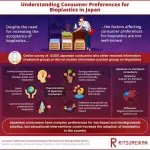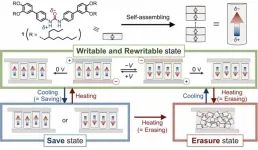Non-biodegradable plastics are major contributors to land and marine pollution, destroying habitats and causing harm to both flora and fauna. Hence, the switch to bioplastics is imperative to ensure sustainability. The success of environmental initiatives aimed at increasing bioplastic adoption critically hinges on understanding consumer behavior. However, consumer preferences and perceptions around bioplastics, particularly in Japan and other Asian countries, are not well understood.
A recent study published online on July 10, 2023 in the Journal of Cleaner Production attempted to find answers to questions surrounding Japanese consumers’ preferences for bioplastics. “So far, attempts to improve bioplastic adoption in Japan have been hindered by a lack of clarity on the factors influencing consumer preferences. We attempted to shed light on these factors in our comprehensive large-scale study,” explains Professor Takuro Uehara from the College of Policy Science, Ritsumeikan University, who led the study.
The goal of the study was three-fold: understanding how familiar consumers in Japan are with bioplastics, revealing their preferences for bioplastics based on different factors, and examining how educational interventions affect their choices. To achieve this, the researchers surveyed over 12,000 respondents using questions focused on three products — 500 mL PET water bottles, three-color ballpoint pens, and 500 mL shampoo bottles. The respondents were divided into two groups: the treatment group, who were educated on the basic distinctions between bio-based and biodegradable plastics, and the control group, who did not receive educational interventions. Then, the researchers performed discrete choice experiments and text mining based on responses from these 12,000 participants.
Their findings yielded interesting insights, particularly highlighting a common trend among Japanese consumers and their European counterparts, which is a limited comprehension of the distinctions between bio-based, biodegradable, and bioplastics. Surprisingly, most respondents were unaware of the fact that not all bioplastics are biodegradable and bio-based. This demonstrated the need to improve consumer awareness regarding the characteristics and environmental impact of bioplastics.
Another important finding was the complexity of consumer preferences for bioplastics in Japan and the influence of general perceptions and personal values on these preferences. Notably, the preference for bioplastics among these consumers was not unconditional. In fact, most consumers were not in favor of using biomass in any of the three products. Among the different types of feedstock, they preferred sugarcane over wood chips, and favored waste cooking oil the least. This was likely owing to their greater emphasis on quality than on the trade-offs of biomass feedstock.
Nevertheless, there were several key factors the respondents considered valuable in their preference for bioplastics. These included the reduction in carbon dioxide emissions, which was the most valued attribute across all three products in both the control and treatment groups. Another key factor was biodegradability, which was associated with positive responses from participants. Significantly, the respondents expressed a preference for domestic products, although the reasons were generally related to safety, quality, and reliability rather than environmental considerations.
Finally, the findings showed that educational interventions can influence consumer decisions, increasing their willingness to pay for more environmentally friendly products, including those with better feedstock incorporation and those enabling reductions in CO2 emissions. For example, after learning that bioplastics can be fossil-based, respondents gave greater value to products with reduced CO2 emissions. Interestingly, this preference was only significant for water bottles, suggesting that consumers were more sensitive to water bottles — that tend to be less durable — than to the other two products.
Overall, the findings provide a picture of the kinds of products Japanese consumers prefer and the attributes they focus on while making choices surrounding bioplastics. Prof. Uehara comments, “Our results will help Japanese industries and governments understand the type of bioplastics that would be preferred and accepted by consumers, giving them an impetus to develop more such products and improve bioplastic use.” He adds, “Information dissemination can influence consumer preference for bioplastic products, which highlights the importance of awareness campaigns.”
The findings from Prof. Uehara and his group could serve as a foundational roadmap for increasing bioplastic use in Japan and mark a significant step in Japan’s transformation into a bioeconomy.
***
Reference
DOI: https://doi.org/10.1016/j.jclepro.2023.137979
About Ritsumeikan University, Japan
Ritsumeikan University is one of the most prestigious private universities in Japan. Its main campus is in Kyoto, where inspiring settings await researchers. With an unwavering objective to generate social symbiotic values and emergent talents, it aims to emerge as a next-generation research university. It will enhance researcher potential by providing support best suited to the needs of young and leading researchers, according to their career stage. Ritsumeikan University also endeavors to build a global research network as a “knowledge node” and disseminate achievements internationally, thereby contributing to the resolution of social/humanistic issues through interdisciplinary research and social implementation.
Website: http://en.ritsumei.ac.jp/
About Professor Takuro Uehara from Ritsumeikan University, Japan
Takuro Uehara is a Professor at the College of Policy Science, Ritsumeikan University. His research deals with a range of subjects, including social-ecological modeling, economic valuation of nature, sustainability, resilience, relational values, and marine plastic pollution.
He obtained his doctoral degree in Systems Science: Economics from Portland State University. He has authored research papers in leading journals, including Ecological Economics, Ecology and Society, Ecosystem Services, Journal of Environmental Management, Journal of Cleaner Production, People and Nature, Science of The Total Environment, and Sustainability Science.
Funding information
This study was funded by the Environment Research and Technology Development Fund of the Environmental Restoration and Conservation Agency of Japan [JPMEERF21S11920].
END




